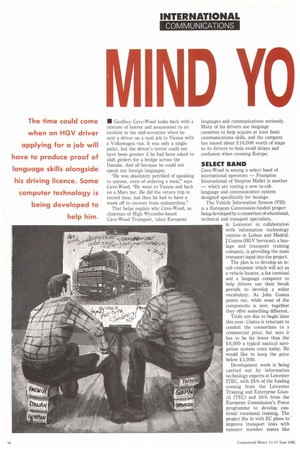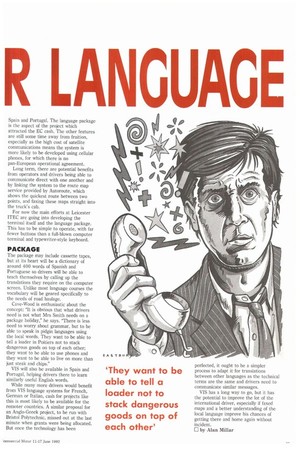M IND YO R LANGUA G E
Page 38

Page 39

If you've noticed an error in this article please click here to report it so we can fix it.
• Geoffrey Cave-Wood looks back with a mixture of horror and amusement to an incident in the mid-seventies when he sent a driver on a rush job to Vienna with a Volkswagen van. It was only a single pallet, but the driver's terror could not have been greater if he had been asked to shift girders for a bridge across the Danube. And all because he could not speak any foreign languages.
"He was absolutely petrified of speaking to anyone, even of ordering a meal," says Cave-Wood. "He went to Vienna and back on a Mars bar. He did the return trip in record time, but then he had to have a week off to recover from malnutrition."
That helps explain why Cave-Wood, as chairman of High Wycombe-based Cave-Wood Transport, takes European languages and communications seriously. Many of his drivers use language cassettes to help acquire at least basic communications skills, and the company has issued about £10,000 worth of maps to its drivers to help avoid delays and confusion when crossing Europe.
SELECT BAND
Cave-Wood is among a select band of international operators — Frampton International of Shepton Mallet is another — which are testing a new in-cab language and communication system designed specificially for haulage.
The Vehicle Information System (VIS) is a European Commission-funded project being developed by a consortium of educational, technical and transport specialists, in Leicester in collaboration with information technology centres in Lisbon and Madrid. J Coates (HGV Services), a haulage and transport training company, is providing the main transport input into the project.
The plan is to develop an incab computer which will act as a vehicle locator, a fax terminal and a language computer to help drivers use their break periods to develop a wider vocabulary. As John Coates points out, while none of the components is new, together they offer something different.
Trials are due to begin later this year. Coates is reluctant to commit the consortium to a commercial price, but says it has to be far lower than the £6,000 a typical nautical navigation system costs today. He would like to keep the price below £1,000.
Development work is being carried out by information technology experts at Leicester ITEC, with 25% of the funding coming from the Leicester Training and Enterprise Council (TEC) and 50% from the European Commission's Force programme to develop continual vocational training. The project fits in with EC plans to improve transport links with remoter member states like Spain and Portugal. The language package is the aspect of the project which attracted the EC cash. The other features are still some time away from fruition, especially as the high cost of satellite communications means the system is more likely to be developed using cellular phones, for which there is no pan-European operational agreement.
Long term, there are potential benefits from operators and drivers being able to communicate direct with one another and by linking the system to the route map service provided by Autoroute, which shows the quickest route between two points, and faxing these maps straight into the truck's cab.
For now the main efforts at Leicester ITEC are going into developing the terminal itself and the language package. This has to be simple to operate, with far fewer buttons than a full-blown computer terminal and typewriter-style keyboard.
PACKAGE
The package may include cassette tapes, but at its heart will be a dictionary of around 400 words of Spanish and Portuguese so drivers will be able to teach themselves by calling up the translations they require on the computer screen. Unlike most language courses the vocabulary will be geared specifically to the needs of road haulage.
Cave-Wood is enthusiastic about the concept: "It is obvious that what drivers need is not what Mrs Smith needs on a package holiday," he says. "There is less need to worry about grammar, but to be able to speak in pidgin languages using the local words. They want to be able to tell a loader in Poitiers not to stack dangerous goods on top of each other; they want to be able to use phones and they want to be able to live on more than just steak and chips."
VIS will also be available in Spain and Portugal, helping drivers there to learn similarly useful English words.
While many more drivers would benefit from VIS language systems for French, German or Italian, cash for projects like this is most likely to be available for the remoter countries. A similar proposal for an Anglo-Greek project, to be run with Bristol Polytechnic, missed out at the last minute when grants were being allocated. But once the technology has been perfected, it ought to be a simpler process to adapt it for translations between other languages as the technical terms are the same and drivers need to communicate similar messages.
VIS has a long way to go, but it has the potential to improve the lot of the international driver, especially if faxed maps and a better understanding of the local language improve his chances of getting there and home again without incident.
by Alan Millar
















































































